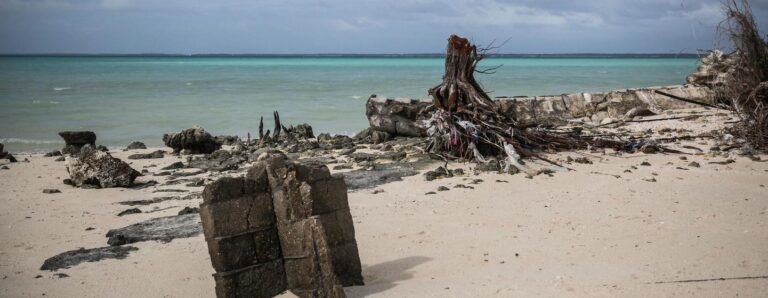
[ad_1]
Addressing the UN General Assembly on Thursday, Presidents of Kiribati, Timor-Leste, Micronesia and Nauru called for accelerated climate action, urging major emitters worldwide to commit to substantial reductions in emissions by 2030.
These nations, while contributing negligibly to global emissions, highlighted bold ambitions to curb their own carbon footprints, exemplified by Micronesia’s pledge to reduce CO2 emissions from electricity generation by over 65 per cent below 2000 levels.
The leaders also highlighted challenges ranging from poverty and quality healthcare, to harnessing technology and combatting corruption.
With “resilience embedded in their DNA”, they urged global solidarity to combat these pressing challenges and safeguard the wellbeing of their people.
Committed to sustainable development
President Taneti Maamau of Kiribati emphasized the importance of rebuilding trust in multilateral cooperation and diplomacy, especially in a world facing geopolitical tensions, economic disparities, and unforeseen challenges like pandemics and climate-related crises.
He reaffirmed his country’s commitment to the 2030 Agenda and outlined programmes to implement SDGs at the national level.
“To ensure sustainability and ownership of our desired developmental goals, we have engaged in extensive consultations at all levels,” he said.
President Maamau also highlighted that as part of its commitment to global peace, Kirbati is working closely with the UN to engage its police in peacekeeping missions, and that it will promote empowerment of women and girls, as well as people with disabilities, elders, unemployed, youth and children.
“Enhancing prosperity is essential for sustaining peace and so the government is dedicated to people-centric principles, placing citizens at the centre of our decisions and services, and promoting transparent governance,” he said.
Beware the climate-conflict nexus
President José Ramos-Horta of Timor-Leste drew attention to the impact of rising temperatures in worsening conflicts and violence, particularly in vulnerable States.
“We need a new outlook on the climate and security nexus, which will address the impacts of climate change and environmental degradation on peace, security and ensure that the quest for energy transition does not worsen the security situation in fragile countries,” he said.
President Ramos-Horta pointed out that overseas development assistance (ODA) has declined continuously since the 2007 subprime crisis, exacerbated by the COVID-19 pandemic and the war in Ukraine.
He highlighted that it would be a “leap forward” in international solidarity if OECD countries allocated 1 percent of national GDPs to ODA.
“We would see positive effects on poverty rates, food security, access to basic health services, education, electricity, drinking water, sanitation, housing and social security, with multiplier effects on the diversification of economies, especially in agriculture,” he explained.
We have bold ambitions
Wesley Simina President of the Federated States of Micronesia emphasized the Paris Agreement as a critical tool for addressing the climate crisis, although the current commitments under the agreement were insufficient to limit global warming to 1.5°C, a target crucial for small island nations like Micronesia.
He highlighted the importance of a “fast-acting mandatory approach”, modelled after successful environmental agreements like the Montreal Protocol, to cut methane emissions and other short-lived climate pollutants.
President Simina stressed the need for major emitters, both developed and developing, to commit to substantial emission reductions by 2030, peaking by 2025, in alignment with IPCC recommendations.
As for Micronesia, though it has negligible global emissions, “it has bold ambitions”, he added:
“By 2030 we aim to reduce CO2 emissions from electricity generation by more than 65 per cent below 2000 levels. By 2050 Micronesia will achieve ‘net zero’.”
Stand united for ‘the right things’
President Russ Joseph Kun of Nauru also stressed the urgency of climate action and transition from fossil fuels.
Highlighting the potential of deep seabed minerals, particularly polymetallic nodules, as a key solution for that shift, he called on the International Seabed Authority to regulate the responsible use of these minerals to ensure its benefits for all humankind while protecting marine ecosystems.
“As a Big Ocean State, a healthy productive and resilient ocean is a pillar upon which our future rests,” President Kun said, urging international support to ratify and implement the landmark BBNJ high seas treaty, promote sustainable fisheries, and combat illegal, unreported, and unregulated fishing.
President Kun reiterated the need for the global community to work together to create a safe and just world for all, leaving no country behind, adding:
“I would like to share what time has taught me. Our community – Nauru, the Pacific, the small islands, the international community – is more robust when we stand united … but we must stand united for the right things, the important things, and the hard things.”
[ad_2]
